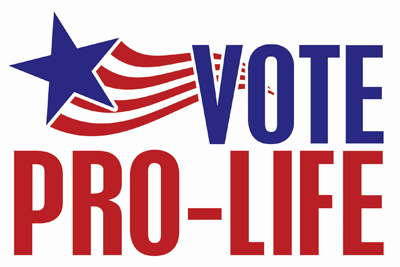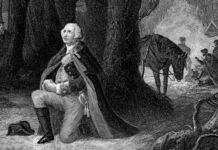In 2018 the Iowa Legislature passed the Heartbeat Law which prohibited the murder of a baby through abortion after a heartbeat was detectable, usually at the six week mark of a pregnancy. On January 23, 2019, State Judge Michael Huppert “struck down” the law as unconstitutional. Iowa Governor Kim Reynolds decided to let the law die without appeal, as so many in the executive and legislative branches of government have done for similar laws these past several decades; bowing knee in obeisance to the decree of judges. As if the court is the final say in what’s lawful. It is not.
As a nation, we’ve been resigned to the “fact” that murdering babies through abortion is “settled law” via the 1973 Roe v Wade Supreme Court “ruling”. From the pulpits we’re variously told that abortion’s “a political issue and we’re not to be involved in politics”, that we’re commanded by God to be blindly “obedient to government and to think otherwise is rebellion against God”, or in many churches baby murder is never addressed. Others claim abortion is actually moral as it preserves a mother’s “sacred right” to make her own medical decisions, you know, like murdering her own baby. Did that last part sound harsh? If it did, have you ever considered what an actual abortion entails, what the baby endures while he or she is being killed? Harsh doesn’t even begin to describe that process.
The Christians’ options in dealing with abortion is limited, we’re told, praying, sending money to pro-life organizations, and if you’re so inclined, voting for pro-life candidates. These things should salve our conscience, right? I mean it’s all we can do. And over the last forty-six years over 60 million babies have been murdered in abortion slaughterhouses, the actual numbers being much higher when chemical abortions are factored in, with no end in sight. If you believe any of the things written in parenthesis above, if your actions have been limited by these beliefs to the three options listed to start this paragraph then you’ve been woefully deceived about the nature and scope of government and your duties as a Christian and citizen. In short, you’ve fallen for a cascading series of falsehoods that collectively equate to the big lie.
“If you tell a lie big enough and keep repeating it, people will eventually come to believe it. The lie can be maintained only for such time as the State can shield the people from the political, economic and/or military consequences of the lie. It thus becomes vitally important for the State to use all of its powers to repress dissent, for the truth is the mortal enemy of the lie, and thus by extension, the truth is the greatest enemy of the State.” – Joseph Goebbels, Nazi, Minister of Propaganda
It’s appropriate to read the big lie philosophy from one of the early progenitors of legalized abortion; the Nazis. Truth is the mortal enemy of the Judicial Supremacy that we’ve been conditioned to accept. So let’s get to some truth. First off, judges and/or courts don’t issue rulings, they offer opinions. They have no constitutional authority to make, alter or abolish laws. That authority is given exclusively to the Legislative Branch of government.
“All legislative powers herein granted shall be vested in a Congress of the United States, which shall consist of a Senate and House of Representatives.” Article 1, Section 1, U.S. Constitution
All means all. The concept of judicial review, the idea that the judiciary (established in Article 3 of the Constitution) has the power to review and overturn laws legally passed by Congress or state legislatures, does not exist in the Constitution. So where does this idea of the court having judicial review come from? The Marbury v Madison 1803 court case. Let’s review that with the appropriate background.
In 1787 the US Constitution was written, ratified in 1788 and came into effect in 1789. Though the framework of our Constitutional Republic laid, further legislation was needed to fill in the particulars of government. Later in the year, the Judiciary Act of 1789 was passed to flesh out the details of the judicial branch. In 1800, the contentious election for president saw anti-federalist, Democratic-Republican Party candidate Thomas Jefferson defeat incumbent John Adams of the reigning Federalist Party. Just before President Adams left office, he commissioned a large number of people to various positions in government to fill it with as many federalists as he could. The man in charge of delivering these commissions, which were hand-written papers in that day, was Secretary of State John Marshall. President Adams had also appointed Marshall to the Supreme Court as Chief Justice. Marshall’s last month as Secretary of State was also his first month on the Supreme Court. An obviously busy man, Marshall failed to deliver all of Adams’ commissions before the incoming Jefferson Administration took office. Upon assuming office, President Jefferson ordered his new Secretary of State, James Madison, not to deliver any of the remaining Adams commissions, considering those undelivered appointments void. Jefferson understandably wanted his own appointees in those positions.
One of those who didn’t receive his Adams commission was William Marbury. Marbury brought suit in federal court to have his commission as a justice of the peace upheld. This case, Marbury v Madison, came before the Supreme Court in 1803. Marbury sought to have the Supreme Court order President Jefferson to honor his commission from former President Adams. Here’s where it gets interesting. The Judiciary Act of 1789, in article 13, attempted to bestow on the judiciary the power of writ of mandamus; a court order that commands a government official to perform their duty as directed by the court. What that would mean is that the Executive Branch Secretary of State, James Madison, would be ordered by the Supreme Court (Judicial Branch) to disobey the Chief Executive, President Jefferson, to heed their instructions. The 4-0 opinion of the Supreme Court was that Madison should deliver the commission to Marbury though they acknowledged that they lacked the authority to order it. In this decision, the Court affirmed the supremacy of the Constitution which superseded article 13 of the 1789 Judiciary Act in its attempt to unconstitutionally expand the courts authority against the limitations imposed on the judiciary in Article 3 of the Constitution. Advocates of Judicial Review claim that the Supreme Court struck down Article 13 of the 1789 Judiciary Act as unconstitutional. The Court struck down nothing. They merely acknowledged that they were bound by the Constitution just as the other branches of government were. The decision affected only the conduct of the judiciary, not the law-making authority of the Congress.
“It is apparent, that the framers of the constitution contemplated that instrument (the Constitution), as a rule for the government of courts, as well as of the legislature. Why otherwise does it direct the judges to take an oath to support it (Article 6, US Constitution)? This oath certainly applies, in an especial manner, to their conduct in their official character. How immoral to impose it on them, if they were to be used as the instruments, and the knowing instruments, for violating what they swear to support!”—John Marshall, Chief Justice of the Supreme Court, Marbury v Madison decision, 1803
Here we need to understand what this means. The judiciary had to obey the limitations that he Constitution placed on it. Marshall is admitting that the court doesn’t have the authority of judicial review, that is, to annul the law. But on the other hand, the judiciary can’t exercise statutory authority not granted it in the Constitution. To do so would violate the separation of powers and make the judiciary supreme over the other branches of government. Also importantly, and certainly considered, President Jefferson would’ve ignored any “order” from the court, as other Presidents would later do. That would be a showdown Marshall and the Court would have resoundingly lost. Courts have no enforcement authority. That authority lies solely with the Executive Branch.
“You seem to consider the judges as the ultimate arbiters of all constitutional questions; a very dangerous doctrine indeed, and one which would place us under the despotism of an oligarchy. Our judges are as honest as other men, and not more so. They have, with others, the same passions for party, for power, and the privilege of their corps…. Their power [is] the more dangerous as they are in office for life, and not responsible, as the other functionaries are, to the elective control. The Constitution has erected no such single tribunal, knowing that to whatever hands confided, with the corruptions of time and party, its members would become despots. It has more wisely made all the departments (Legislative, Executive, and Judicial) co-equal (within their delegated authorities) and co-sovereign within themselves.” –Thomas Jefferson to Chief Justice John Marshall
Yet many bright legal minds still claim that the Marshall Court exercised judicial review in striking down an unconstitutional provision of the law, and in doing so, set a precedent. Here’s the point, even if it had, which it didn’t, a court declaration then or any time that violates the Constitution, is null and void. Judges cannot usurp authority not theirs. The Constitution necessarily binds the judiciary as it does the legislative and executive branches.
“Congress shall make no law respecting an establishment of religion, or prohibiting the free exercise thereof…”—1st Amendment to the US Constitution
Notice this restraint applies only to Congress, the Legislative Branch. Why doesn’t the Amendment refer to the broader government instead of just Congress? Because only Congress can make laws! Only Congress can modify, alter or abolish laws, not the judiciary, not the president. Can this be any clearer? Still the power of judicial review is taught in law schools and expected to be honored throughout the judicial system if one wants to progress in their law career. This big lie, judicial review, has affected politicians and populace alike. It’s become unquestioned by the unaware. Now you’re not.
Iowa Governor Kim Reynolds laments that she won’t appeal the Iowa Heartbeat Law struck down by a judge. The good news is she doesn’t have to. The bad news is, for her, she needs to find a spine that’s been lost longer than most of us have been alive. She or some other Governor, even the President, need to assert their Constitutional authority to execute the laws of their state or nation as lawfully passed. To finally say “no” to the monstrous judicial overreach that murders babies every day. It’ll take just one. The political price may be high but it won’t be as high as the price of innocent blood spilled before a holy God.
I hope I’ve got your attention. There’s more to say on this topic. Part 2 coming shortly. I’m just getting warmed up.












